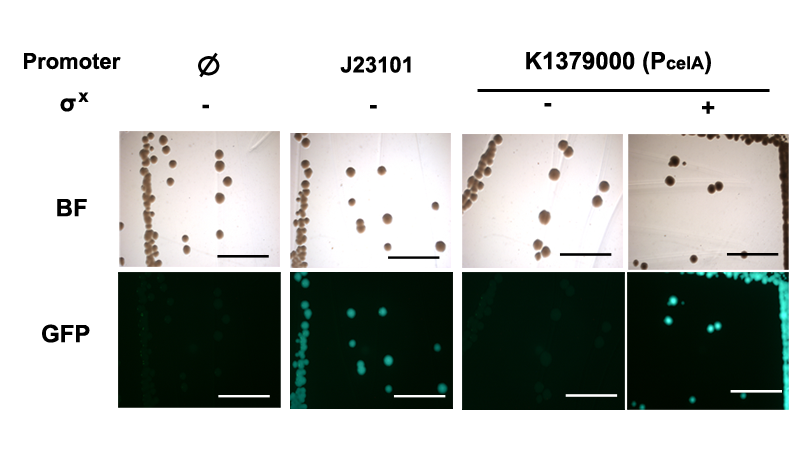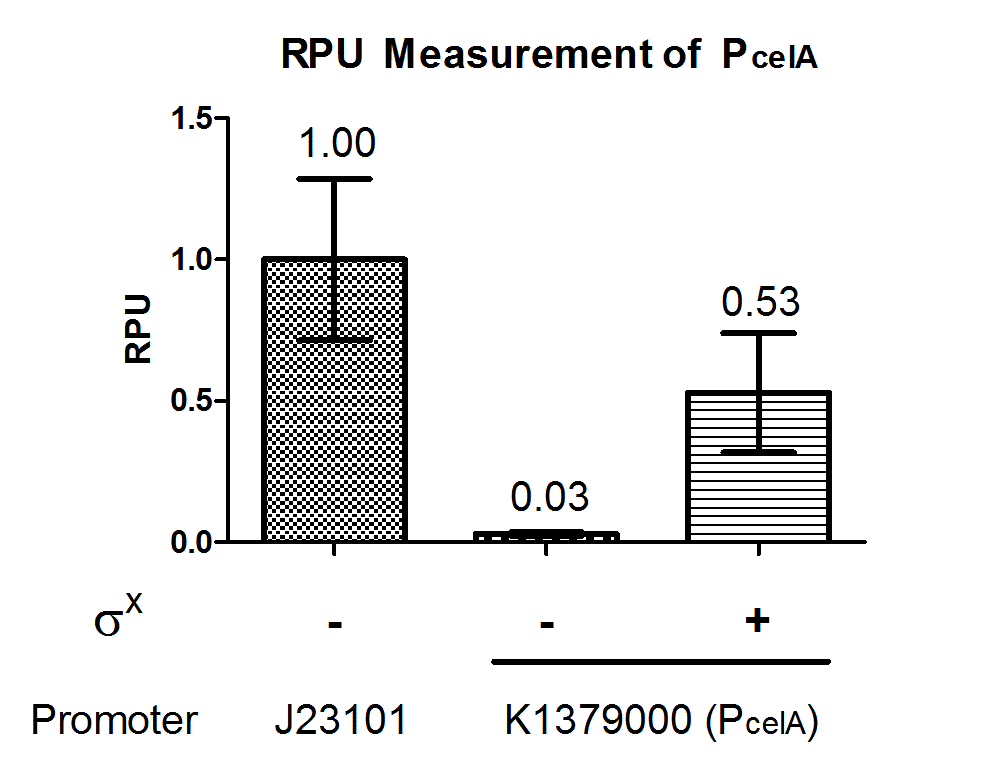Difference between revisions of "Part:BBa K1379000"
(→Usage and Biology) |
(→Usage and Biology) |
||
| Line 4: | Line 4: | ||
===Usage and Biology=== | ===Usage and Biology=== | ||
| − | P<sub>celA</sub> (or <i>celAp</i>) is a σ<sup>X</sup> regulated promoter from <i>Streptococcus pneumoniae</i>. It is a member of the Cin-Box or Com-Box promoter family that share the 8 base pair consensus sequence of TACGAATA, where the sigma factor σ<sup>X</sup> [[Part:BBa_K1379004|BBa_K1379004]] (or ComX) binds to and promotes transcription initiation. During the exponential growth of <i>S. pneumoniae</i>, Competence Signal Peptide (CSP) mediated quorum sensing induces expression of σ<sup>X</sup>. σ<sup>X</sup> as a global regulator then directs <i>S. pneumoniae</i> to enter a transient competent cell state. P<sub>celA</sub> alongside with other Com-Box promoters, is turned on by σ<sup>X</sup> and drives expression of the competence protein CelA. | + | P<sub>celA</sub> (or <i>celAp</i>) is a σ<sup>X</sup> regulated promoter from <i>Streptococcus pneumoniae</i>. It is a member of the Cin-Box or Com-Box promoter family that share the 8 base pair consensus sequence of TACGAATA, where the sigma factor σ<sup>X</sup> [[Part:BBa_K1379004|BBa_K1379004]] (or ComX) binds to and promotes transcription initiation. During the exponential growth of <i>S. pneumoniae</i>, Competence Signal Peptide (CSP) mediated quorum sensing induces expression of σ<sup>X</sup>. σ<sup>X</sup> as a global regulator then directs <i>S. pneumoniae</i> to enter a transient competent cell state. P<sub>celA</sub>, alongside with other Com-Box promoters, is turned on by σ<sup>X</sup> and drives expression of the competence protein CelA. |
Voigt and his colleagues have demonstrated that orthogonal gene expression could be achieved through the use of σs, anti-σs and synthetic promoters. (Rhodius et al., 2013). This principle has been demonstrated to work in <i>E. coli</i> (see characterization below), in which P<sub>celA</sub> can only be turned on in the presence of σ<sup>X</sup>. | Voigt and his colleagues have demonstrated that orthogonal gene expression could be achieved through the use of σs, anti-σs and synthetic promoters. (Rhodius et al., 2013). This principle has been demonstrated to work in <i>E. coli</i> (see characterization below), in which P<sub>celA</sub> can only be turned on in the presence of σ<sup>X</sup>. | ||
Revision as of 19:37, 11 October 2014
PcelA
Usage and Biology
PcelA (or celAp) is a σX regulated promoter from Streptococcus pneumoniae. It is a member of the Cin-Box or Com-Box promoter family that share the 8 base pair consensus sequence of TACGAATA, where the sigma factor σX BBa_K1379004 (or ComX) binds to and promotes transcription initiation. During the exponential growth of S. pneumoniae, Competence Signal Peptide (CSP) mediated quorum sensing induces expression of σX. σX as a global regulator then directs S. pneumoniae to enter a transient competent cell state. PcelA, alongside with other Com-Box promoters, is turned on by σX and drives expression of the competence protein CelA.
Voigt and his colleagues have demonstrated that orthogonal gene expression could be achieved through the use of σs, anti-σs and synthetic promoters. (Rhodius et al., 2013). This principle has been demonstrated to work in E. coli (see characterization below), in which PcelA can only be turned on in the presence of σX.
iGEM 2014 Hong_Kong_HKUST Team has cloned PcelA from S. pneumoniae strain NCTC7465 and characterized its Relative Promoter Units (RPU) in presence and absence of a σX generator BBa_K1379006. Promoter PcomFA (BBa_K1379001), which is another Com-Box promoter recognized by σX, has also been characterized.
Characterization
By linking PcelA promoter with GFP generator (BBa_E0240), and SigmaX generator(BBa_K1379006), the promoter activity was represented by the GFP synthesis rate. Fluorescence was measured when the cells are in the mid-log phase. OD595 values were measured and converted to OD600 to obtain the R.P.U of the promoter.
To measure the RPU (Relative Promoter Unit) of PcelA promoter, we adopted the method described by Kelly et al. in “Measuring the activity of BioBrick promoters using an in vivo reference standard” (Kelly et al., 2009). With the use of EnVision multilabel reader from Perkin Elmer Company, it enabled us to obtain the fluorescence and absorbance of cells over time. GFP intensity and OD595 values were measured every 30 minutes after the E. coli strains are cultured to mid-log phase.
The positive control used in this characterization is BBa_I20260 which is a constitutive promoter BBa_J23101 containing GFP generator BBa_E0240, while the negative control used in this characterization is BBa_K1379002 which is PcelA promoter with GFP generator but without SigmaX generator.
The detailed description including characterization procedure and Data processing of our characterization can be found in [http://2014.igem.org/Team:Hong_Kong_HKUST/pneumosensor/characterization iGEM HKUST 2014 Wiki Page].


Discussion
PcelA promoter is working in E. coli DH10B strain, and express GFP when induced with SigmaX protein. In comparison to the reference promoter BBa_J23101, the R.P.U (Relative Promoter Unit) of PcelA promoter is around 0.5. From Figure 2, we could tell that this promoter is specific as there is almost no GFP expression in the absence of SigmaX protein inducer. This might indicate that the 8 basepairs combox region in PcelA promoter is specific to SigmaX. However, further characterization needs to be done to evaluate crosstalks between this inducer-promoter system.
Sequence and Features
- 10COMPATIBLE WITH RFC[10]
- 12COMPATIBLE WITH RFC[12]
- 21COMPATIBLE WITH RFC[21]
- 23COMPATIBLE WITH RFC[23]
- 25COMPATIBLE WITH RFC[25]
- 1000COMPATIBLE WITH RFC[1000]
Reference
J. R. Kelly, A. J. Rubin, J. H. Davis, J. Cumbers, M. J. Czar, ..., D. Endy. (2009). Measuring the activity of BioBrick promoters using an in vivo reference standard. Journal of Biological Engineering, 3, 4. doi: 10.1186/1754-1611-3-4
